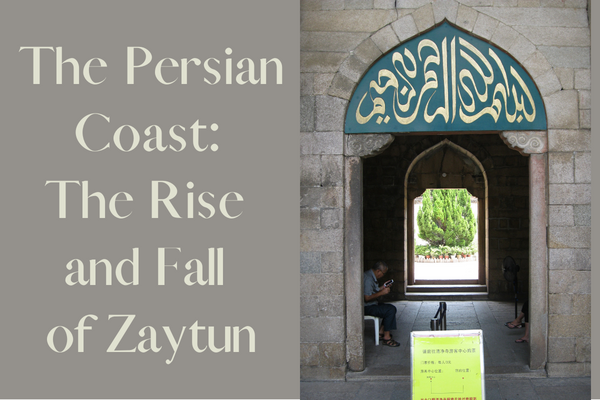
The 2023 CMRS Colloquium Series will feature Amanda Respess (OSU-History Department of Marion) presenting "The Persian Coast: The Rise and Fall of Zaytun."
The 11th to the 14th centuries witnessed an escalation of the scale and success of the Indian Ocean spice and ceramics trade and the growth of foreign merchant communities in Chinese port cities. As commercial opportunities and maritime activities grew under Song and Yuan rule, the position of Muslim merchants in coastal China changed dramatically. After recovering from an era punctuated by xenophobic violence, Muslim merchants prospered on the coast, investing in rebuilding their communities. The transition to Mongol rule elevated the social status of Muslim merchants, but as Mongol control of coastal areas collapsed, life along the seaboard descended into chaos. Epidemics, flooding, famine and new restrictions on Muslim clergy coincided with increasing outbreaks of the plague across the long-distance land and sea routes. The breakdown of law saw increased violence and piracy, and as anti-Mongol rebel movements gained steam the major kilns producing export wares were shuttered.
In 1357, Persian insurgents in Fujian took control of the port city of Quanzhou, known as Zaytun in the medieval Islamicate world, during a period of intense conflict remembered as the Ispah Rebellion. The coast remained under the control of the Persian Garrison for nearly a decade until 1366, when Chinese forces massacred the foreign community in an orgy of violence that shattered the foundations of maritime trade in the city and uprooted the network of merchants that had anchored the spice trade there for centuries.
This lecture will examine this tumultuous period in Chinese-Persianate history from the lens of shipwrecks recovered in the harbor and across the trade routes from the 11th through the 14th centuries and considers the significance of the events at Quanzhou/Zaytun within the context of developments within the broader Islamicate world.
This event is free and open to the public. Sponsored by the Center for Medieval and Renaissance Studies and the Humanities Institute.
Amanda Respess is an assistant professor of premodern world history who specializes in the exchange of medicines and other long-distance trade goods on the Maritime Silk Road. Her work examines the material culture of premodern trade networks in the Persian Gulf, South China Sea and Java Sea and investigates the long duration of Persianate presence in the eastern Indian Ocean region. She is particularly interested in the intersections between the lived experience of maritime travel, medical material culture, the development of Islamicate science and traditional Chinese medicine. Her work engages a critical museum studies approach to trace the afterlives of long-distance maritime trade artifacts from the Indian Ocean World and decolonizes heretofore-segregated histories of global science. Her current book project draws from an archive of shipwreck artifacts recovered from the seafloor between the 9th and 14th centuries to examine the premodern exchange of medical goods and knowledge between Iran and China, and how Islamicate artifacts have been represented in Western museums. She earned her Ph.D. in Anthropology & History (2020) and Graduate Certificate in Museum Studies (2020) from the University of Michigan.
The Humanities Institute and its related centers host a wide range of events, from intense discussions of works in progress to cutting-edge presentations from world-known scholars, artists, and activists, and everything in between. In our current moment of riding the unpredictable currents of the pandemic, we reaffirm the value of in-person engagement. We strive to amplify the energy in the room. But we also recognize the need to be careful and the fact that not all our guests will be able to visit our space. We, therefore, will continue to offer Zoom access to all our events upon request. If you wish to have such access, please send your request to moriarty.8@osu.edu.
